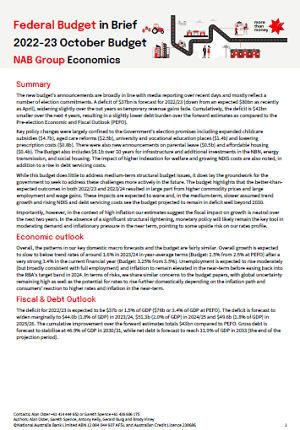Summary
The new budget’s announcements are broadly in line with media reporting over recent days and mostly reflect a number of election commitments. A deficit of $37bn is forecast for 2022/23 (down from an expected $80bn as recently as April), widening slightly over the out years as temporary revenue gains fade. Cumulatively, the deficit is $43bn smaller over the next 4 years, resulting in a slightly lower debt burden over the forward estimates as compared to the Pre-election Economic and Fiscal Outlook (PEFO).
Key policy changes were largely confined to the Government’s election promises including expanded childcare subsidies ($4.7b), aged care reforms ($2.5b), university and vocational education places ($1.4b) and lowering prescription costs ($0.8b). There were also new announcements on parental leave ($0.5b) and affordable housing ($0.4b). The Budget also includes $8.1b over 10 years for infrastructure and additional investments in the NBN, energy transmission, and social housing. The impact of higher indexation for welfare and growing NDIS costs are also noted, in addition to a rise in debt servicing costs.
While this budget does little to address medium-term structural budget issues, it does lay the groundwork for the government to seek to address these challenges more actively in the future. The budget highlights that the better-than-expected outcomes in both 2022/23 and 2023/24 resulted in large part from higher commodity prices and large employment and wage gains. These impacts are expected to wane and, in the medium-term, slower assumed trend growth and rising NDIS and debt servicing costs see the budget projected to remain in deficit well beyond 2030.
Importantly, however, in the context of high inflation our estimates suggest the fiscal impact on growth is neutral over the next two years. In the absence of a significant structural tightening, monetary policy will likely remain the key tool in moderating demand and inflationary pressure in the near term, pointing to some upside risk on our rates profile.
Download the full paper
